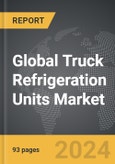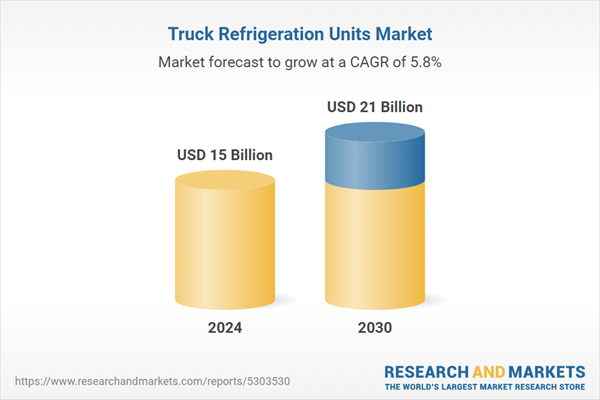Global Truck Refrigeration Units Market - Key Trends & Drivers Summarized
What Are Truck Refrigeration Units, and Why Are They So Crucial in Cold Chain Logistics?
Truck Refrigeration Units (TRUs) are specialized systems designed to maintain controlled temperatures within truck cargo spaces, ensuring the safe transport of perishable goods such as food, pharmaceuticals, and other temperature-sensitive products. These units are mounted on trucks and trailers and use advanced cooling technologies, such as compressor-driven systems and cryogenic cooling, to regulate interior temperatures according to the specific requirements of the cargo. TRUs are vital for cold chain logistics, playing an indispensable role in maintaining product quality and safety from point of origin to final delivery. In sectors like agriculture, seafood, dairy, and pharmaceuticals, TRUs ensure that temperature-sensitive goods retain their integrity throughout the supply chain, reducing spoilage and adhering to stringent safety standards.The demand for TRUs has grown exponentially with the expansion of the global cold chain market, driven by increasing consumer demand for fresh produce, frozen foods, and biopharmaceuticals that require precise temperature management. The growing e-commerce sector, particularly in online grocery delivery, has further propelled the need for reliable TRUs that ensure last-mile cold chain compliance. Regulatory requirements regarding food safety and pharmaceutical storage are also pushing industries to adopt advanced TRUs that offer consistent, real-time temperature control and monitoring. As a result, TRUs are not just logistical components but critical links in modern cold chain infrastructure, ensuring that goods reach their destination in optimal condition.
How Are Technological Advancements Shaping the Evolution of the TRU Market?
Technological advancements have significantly transformed the Truck Refrigeration Units market, leading to more efficient, reliable, and environmentally friendly cooling systems. One of the most notable innovations is the development of hybrid and electric TRUs, which reduce reliance on diesel-powered units, minimize emissions, and comply with stricter environmental regulations. These electric and battery-driven TRUs offer lower operating costs, reduced noise levels, and are suitable for urban deliveries where emission standards are more stringent. Additionally, solar-powered TRUs are emerging as a sustainable alternative, harnessing solar energy to maintain cold temperatures, making them particularly appealing for regions with high solar intensity. These eco-friendly technologies align with the global push toward green logistics, reducing the carbon footprint of cold chain operations while maintaining high performance.Moreover, the integration of IoT (Internet of Things) and telematics into TRUs has brought about significant enhancements in temperature monitoring and fleet management. Advanced TRUs are now equipped with smart sensors that provide real-time data on temperature, humidity, and system performance, allowing operators to track and adjust conditions remotely. This capability is especially critical for transporting high-value goods like vaccines, where even slight temperature fluctuations can lead to spoilage. The incorporation of AI algorithms in TRU systems has further enabled predictive maintenance, where potential issues are identified and addressed before they result in system failure. Such technological advancements not only improve the reliability of TRUs but also align with broader trends in digitalization and data-driven logistics, enhancing operational efficiency and transparency across the cold chain network.
What Are the Emerging Applications of TRUs Across Different Sectors?
The application of Truck Refrigeration Units has expanded significantly beyond traditional sectors, adapting to new and evolving requirements across various industries. In the food and beverage sector, TRUs have long been essential for transporting fresh produce, dairy, meat, and frozen foods. However, with the rise of the ready-to-eat meal market and the growing popularity of online grocery delivery services, TRUs are now pivotal for ensuring that pre-packaged meals, ice creams, and other perishable goods arrive fresh at consumers' doorsteps. Additionally, the demand for TRUs in the pharmaceutical industry has surged, especially for transporting temperature-sensitive medications, vaccines, and biologics. The COVID-19 pandemic further highlighted the importance of TRUs in safely distributing vaccines worldwide, emphasizing the need for reliable cold chain logistics to support global healthcare initiatives.TRUs are also seeing increased demand in other sectors, such as floral delivery, where maintaining a controlled temperature is crucial to preserving product quality during transport. Similarly, the cosmetics industry is beginning to rely on TRUs for products that can degrade or lose efficacy if exposed to fluctuating temperatures. Even niche markets like transporting high-end wines, which require specific temperature ranges to maintain their quality, are driving demand for advanced TRUs. The rise in pet food logistics, where certain premium products require refrigeration, is another emerging segment contributing to the wider adoption of TRUs. As more industries recognize the importance of temperature control in maintaining product quality and extending shelf life, TRUs are becoming essential tools across a broader range of applications.
What Drives Growth in the TRU Market?
The growth in the Truck Refrigeration Units market is driven by several factors, including expanding cold chain logistics, rising demand for fresh and frozen food products, and increasing pharmaceutical transportation. One of the key drivers is the surge in global demand for fresh produce, dairy, seafood, and meat, particularly in urban areas where consumer preferences lean toward convenience and health-focused food choices. E-commerce and online grocery delivery services have further fueled demand for TRUs, as companies strive to deliver fresh products directly to consumers' homes. The pharmaceutical sector also represents a significant growth driver, especially with the development and distribution of vaccines, biologics, and temperature-sensitive drugs that require stringent cold chain compliance. As global healthcare expands, the need for reliable and advanced TRUs becomes increasingly crucial to ensure the safe transport of life-saving medications.Additionally, stringent regulatory requirements for food safety, drug storage, and environmental protection are propelling the adoption of modern TRUs. Governments worldwide have enforced regulations that mandate temperature control during the transportation of perishable goods and pharmaceuticals, driving the demand for advanced TRUs with precise monitoring and control capabilities. The push for greener logistics and lower emissions has also led to increased investment in electric and hybrid TRUs, aligning with global sustainability goals. Furthermore, the rise of urbanization and the increasing need for last-mile delivery solutions have contributed to market growth, as companies seek compact, energy-efficient TRUs that can navigate congested urban centers while maintaining cold chain integrity. With these factors in play, the TRU market is poised for sustained growth, driven by advancements in cold chain technology, expanding end-use industries, and evolving consumer behaviors.
Report Scope
The report analyzes the Truck Refrigeration Units market, presented in terms of market value (US$ Thousand). The analysis covers the key segments and geographic regions outlined below.- Segments: Type (Roof Mount Systems, Split Systems); Vertical (Frozen Food, Pharma Drugs & Chemicals, Ambulance & Passenger Transport).
- Geographic Regions/Countries:World; United States; Canada; Japan; China; Europe (France; Germany; Italy; United Kingdom; Spain; Russia; and Rest of Europe); Asia-Pacific (Australia; India; South Korea; and Rest of Asia-Pacific); Latin America (Argentina; Brazil; Mexico; and Rest of Latin America); Middle East (Iran; Israel; Saudi Arabia; United Arab Emirates; and Rest of Middle East); and Africa.
Key Insights:
- Market Growth: Understand the significant growth trajectory of the Roof Mount Systems segment, which is expected to reach US$12.7 Billion by 2030 with a CAGR of a 6.1%. The Split Systems segment is also set to grow at 5.2% CAGR over the analysis period.
- Regional Analysis: Gain insights into the U.S. market, valued at $3.9 Billion in 2024, and China, forecasted to grow at an impressive 9.1% CAGR to reach $4.9 Billion by 2030. Discover growth trends in other key regions, including Japan, Canada, Germany, and the Asia-Pacific.
Why You Should Buy This Report:
- Detailed Market Analysis: Access a thorough analysis of the Global Truck Refrigeration Units Market, covering all major geographic regions and market segments.
- Competitive Insights: Get an overview of the competitive landscape, including the market presence of major players across different geographies.
- Future Trends and Drivers: Understand the key trends and drivers shaping the future of the Global Truck Refrigeration Units Market.
- Actionable Insights: Benefit from actionable insights that can help you identify new revenue opportunities and make strategic business decisions.
Key Questions Answered:
- How is the Global Truck Refrigeration Units Market expected to evolve by 2030?
- What are the main drivers and restraints affecting the market?
- Which market segments will grow the most over the forecast period?
- How will market shares for different regions and segments change by 2030?
- Who are the leading players in the market, and what are their prospects?
Report Features:
- Comprehensive Market Data: Independent analysis of annual sales and market forecasts in US$ Million from 2024 to 2030.
- In-Depth Regional Analysis: Detailed insights into key markets, including the U.S., China, Japan, Canada, Europe, Asia-Pacific, Latin America, Middle East, and Africa.
- Company Profiles: Coverage of players such as Carrier, Daikin, Denso, Klinge, Mitsubishi Heavy Industries, Ltd. and more.
- Complimentary Updates: Receive free report updates for one year to keep you informed of the latest market developments.
Some of the 42 companies featured in this Truck Refrigeration Units market report include:
- Carrier
- Daikin
- Denso
- Klinge
- Mitsubishi Heavy Industries, Ltd.
- Mobile Climate Control
- Sanden
- Subros
- Thermo King
- Utility Trailer
- Webasto
- Zanotti S.p.A.
This edition integrates the latest global trade and economic shifts into comprehensive market analysis. Key updates include:
- Tariff and Trade Impact: Insights into global tariff negotiations across 180+ countries, with analysis of supply chain turbulence, sourcing disruptions, and geographic realignment. Special focus on 2025 as a pivotal year for trade tensions, including updated perspectives on the Trump-era tariffs.
- Adjusted Forecasts and Analytics: Revised global and regional market forecasts through 2030, incorporating tariff effects, economic uncertainty, and structural changes in globalization. Includes historical analysis from 2015 to 2023.
- Strategic Market Dynamics: Evaluation of revised market prospects, regional outlooks, and key economic indicators such as population and urbanization trends.
- Innovation & Technology Trends: Latest developments in product and process innovation, emerging technologies, and key industry drivers shaping the competitive landscape.
- Competitive Intelligence: Updated global market share estimates for 2025, competitive positioning of major players (Strong/Active/Niche/Trivial), and refined focus on leading global brands and core players.
- Expert Insight & Commentary: Strategic analysis from economists, trade experts, and domain specialists to contextualize market shifts and identify emerging opportunities.
Table of Contents
Companies Mentioned (Partial List)
A selection of companies mentioned in this report includes, but is not limited to:
- Carrier
- Daikin
- Denso
- Klinge
- Mitsubishi Heavy Industries, Ltd.
- Mobile Climate Control
- Sanden
- Subros
- Thermo King
- Utility Trailer
- Webasto
- Zanotti S.p.A.
Table Information
| Report Attribute | Details |
|---|---|
| No. of Pages | 276 |
| Published | February 2026 |
| Forecast Period | 2024 - 2030 |
| Estimated Market Value ( USD | $ 15 Billion |
| Forecasted Market Value ( USD | $ 21 Billion |
| Compound Annual Growth Rate | 5.8% |
| Regions Covered | Global |









